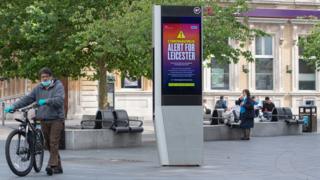 Image copyright
PA Media
Image caption
Lockdown restrictions have been reintroduced in Leicester following a rise in coronavirus cases
Image copyright
PA Media
Image caption
Lockdown restrictions have been reintroduced in Leicester following a rise in coronavirus cases
The government must provide vital data more quickly to local authorities to help them deal with Covid-19 spikes in their areas, doctors say.
The comments from the British Medical Association follow criticism about the length of time it took to get testing data to officials in Leicester.
The city is the first to experience a local lockdown, after a rise in coronavirus cases.
The government insisted it had been working closely with local partners.
However, the BMA, the union representing doctors in the UK, said ministers needed to be more open and transparent with Covid-19 data and about how regional spikes in infections will be managed in the future.
The BMA says its members have expressed concerns about the prospect of a second wave of the virus, "heightened by local flare-ups".
BMA council chair Dr Chaand Nagpaul said providing local leaders with up-to-date information was "vital" in containing outbreaks, particularly as a contact-tracing app is not yet in place.
"The prime minister has talked about a 'whack a mole' strategy to tackle local outbreaks, but this is no use if the people leading the response on the ground - be they public health teams or local leaders - are not given the most accurate up-to-date data possible," he said.
The lockdown is set to ease further in England on Saturday, including the reopening of bars, restaurants and hair salons, but the BMA said it wanted the government to set metric "trigger points" for when action will be taken to reintroduce local and national restrictions.
The BMA said this metric should consider not only the regional reproductive number or R rate - the number of people that one infected person, on average, will pass the virus on to - but also the proportion of the population currently infected.
It also called on the government to:
share "timely, comprehensive and reliable information" to all those involved in the management of new cases at a local level give "clear, consistent guidance" to the public that strict social distancing and infection control measures must continue to be adhered to, including the use of face coverings in public places where social distancing is not possible guarantee adequate supplies of personal protective equipment (PPE) to areas impacted by localised spikes in infection rates, and give local health providers the power decide how or when to reprioritise care in the event of a new waveA government spokesperson said it had been working closely with local partners, providing the resources and tools needed to take swift action to deal with any new local spikes in infection.
Scientists such as Dr Bharat Pankhania, a senior clinical lecturer at the University of Exeter, have warned there will be local outbreaks in other areas of the country in the coming months.
He told the BBC such outbreaks were "inevitable" and testing and contact tracing should be led by local experts.
Under the local lockdown, announced on Monday evening, non-essential shops in Leicester have been forced to shut and schools have closed, except for vulnerable pupils and children of "critical workers". People are also being advised not to travel in or out of the city.
The measures will last until at least 18 July and apply to the city centre and a number of suburbs.
But Leicester's mayor, Sir Peter Soulsby, has criticised the government and Public Health England for being too slow to share testing data with the city's officials.
He said officials in the city had tried to get figures from the government "for weeks".
Health Secretary Matt Hancock said Leicester had "10% of all positive cases in the country over the past week".
The city's seven-day infection rate was 135 cases per 100,000 people - three times that of the next highest city.
Bradford, Barnsley and Rochdale have all seen 45 or more cases per 100,000 people in the last week.
The Department of Health said as of 17:00 on Monday, 43,730 people had died with coronavirus in the UK, an increase of 155 on the previous day.

 5 years ago
665
5 years ago
665 

